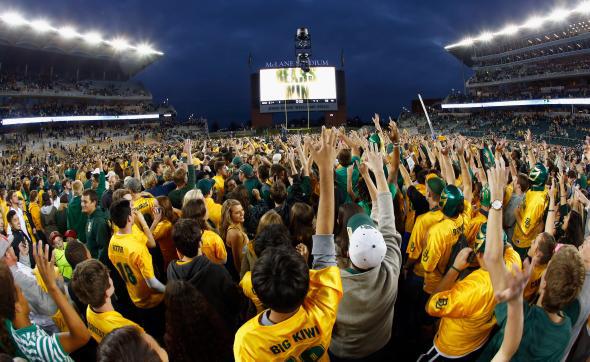Last week, USA Swimming imposed a lifetime ban on former Stanford University swimmer Brock Turner in response to his sexual assault of an unconscious woman. A Change.org petition with over 100,000 signatures, written by the son of a rape survivor, is urging the NCAA to take the same hard line against college athletes who are found to have perpetrated violence. “I’m a college athlete, and I watch ESPN religiously,” wrote Darius Adams, whose efforts were first reported in the Huffington Post. “There’s a serious problem in sports. We don’t take sexual violence seriously enough. … Schools are still more worried about money and football than people’s lives.”
Adams isn’t the first person to push the NCAA on this issue; the association’s response has been, essentially, that athletic departments shouldn’t be in the position of arbitrating sexual assault charges. “The first responsibility for student behavior that’s not part of the competitive environment resides with campuses themselves” or with “the legal system of that state,” NCAA President Mark Emmert told Al Jazeera in 2015. In most ways, that’s true: When athletic departments get involved in overseeing sexual assault cases, they can introduce a double-standard that privileges student athletes and harms their victims, as Senator Claire McCaskill has pointed out. But, by banning convicted offenders, the NCAA could accomplish something courts and colleges can’t: stopping talented athletes with violent records from transferring to new schools in order to continue their careers.
The issue of players parlaying their skills into second chances is exemplified by the recent series of scandals at Baylor University. In 2013, the Texas university’s football team, the Baylor Bears, brought on a star defensive end named Sam Ukwuachu from Boise State University—even though, as Jessica Luther and Dan Solomon reported in Texas Monthly, school officials “either knew, or should have known, that Ukwuachu had a history of violent incidents.” Not long after arriving at Baylor, Ukwuachu raped a freshman woman. Baylor athletics also has a history of helping accused players transfer to new programs, according to an independent report that Baylor commissioned. It’s unclear whether this occurred in the case of Tevin Elliott, who is accused of assaulting up to six women during his time at Baylor; Elliott transferred to the University of Central Arkansas after he was accused of rape, though he was indicted before ever playing for his new team.
The Baylor case inspired Adams’ petition. His mother, Brenda Tracy, was allegedly drugged and gang-raped by four football players at an Oregon State University party in 1998; only two of the men played for Oregon State, and they were punished with 25 hours of community service and a one-game suspension. When Tracy saw the Baylor news, “she was really, really upset. She was pacing around the house trying to figure out what she could do to help,” Adams told HuffPo. “That’s when the idea of the letter came up.”
Tracy went public with her ordeal in 2014 and has since become an activist working to reduce sexual assault in Oregon. Most notably, she helped lobby the Pac-12, a conference within the NCAA, to create a policy under which athletes whose offense precludes re-enrollment at their original college cannot transfer to play on a Pac-12 team. The national organization has not said whether it will seriously consider Adams’s petition, though Emmert responded to praise his “commendable” and “compelling” activism.
“These schools have proven that they are not going to do the right thing,” Adams writes. “I believe it is your responsibility to step in.” Baylor is far from alone in proving him right. As Adams writes in his petition: “The truth is that some rapists and criminals just happen to possess outstanding athletic ability.” For too long, the NCAA has looked the other way when those gifts shield their owners from just repercussions. If the association would make it clear that rapists and abusers will have nowhere to play, the culture of college sports might finally change.
